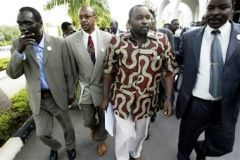Sudanese government rejects Darfur SLM-Nur demands
May 15, 2006 (ABUJA) — The Sudanese government has rebuffed an overture from a Darfur rebel leader, preventing him from joining a peace agreement by Monday’s deadline despite intense pressure to sign, an adviser to the rebel chief said.
 However, Abdelwahid Mohamed al-Nur of the Sudan Liberation Army (SLA) wants to keep trying to make a deal with Khartoum and talks look set to continue beyond the deadline because diplomats are desperate to gain wider support for the peace accord.
However, Abdelwahid Mohamed al-Nur of the Sudan Liberation Army (SLA) wants to keep trying to make a deal with Khartoum and talks look set to continue beyond the deadline because diplomats are desperate to gain wider support for the peace accord.
Nur rejected the peace settlement signed on May 5 by the Sudanese government and rival SLA factional leader Minni Arcua Minnawi to end a conflict that has killed tens of thousands.
News of the accord sparked violence in Darfur, where many feel it lacks legitimacy because only one rebel faction signed. The international community fears the agreement, the result of close to two years of painstaking talks, will not stop the war.
“We received a response from the Sudanese government and it was not positive enough for us to go ahead and sign,” said Ibrahim Madibo, a close adviser to Nur who is still in the Nigerian capital Abuja, where the peace talks took place.
Nur wanted the government to meet his key demands in an annex accord, after which he would sign the broader peace deal.
“They (the government) do not approve the memorandum of understanding because they say the peace agreement is final,” Madibo told Reuters.
Nur’s demands include greater compensation from Khartoum to Darfur war victims, more political posts for the SLA and greater SLA involvement in the security of internal refugees returning home and in the disarmament of pro-government militias.
DEADLINE SEEN SLIPPING
The SLA and smaller rebel group the Justice and Equality Movement (JEM) took up arms in early 2003 accusing the Arab-dominated central government of neglecting Darfur, an ethnically mixed region the size of France in western Sudan.
Khartoum backed militias known as Janjaweed, drawn from Arab tribes, to crush the rebellion. The ensuing campaign of murder, looting, rape and arson has driven more than 2 million from their homes into refugee camps in Darfur and neighbouring Chad.
Nur is weak militarily but his endorsement of the agreement is important because he is a member of the Fur tribe, Darfur’s largest. His rival Minnawi has more fighters but he is from the smaller Zaghawa ethnic group.
The JEM has also rejected the peace accord, but observers say this is less of a problem because the group has few fighters left in Darfur and its constituency is small.
The African Union (AU), which brokered the accord, had set a meeting of its Peace and Security Council in the Ethiopian capital Addis Ababa on Monday as a deadline for any new signature.
Nur has written a letter to the AU asking for further help in trying to bridge the gap between him and the government. Diplomats said the AU was likely to accept as it did not want to give up hope of seeing Nur sign the accord.
Refugees have rioted against the agreement in several Darfur camps and students from the region have protested in the capital Khartoum. The violence has killed at least two people and heightened fears the war would continue despite the accord.
Nur’s next move will depend on the communique that will be released at the end of the AU meeting, Madibo said.
(Reuters)
